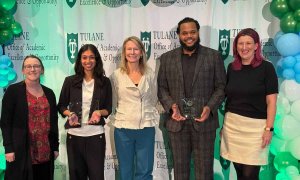Tulane SoPA helps professionals enhance careers and withstand economic changes
Editor's note: This article appeared first on Nola.com.
In the current labor market, where job seekers have more options than ever, it may be tempting for people to put education on the back burner or consider it an unnecessary expense. However, research shows that in the long term, investing in degrees or certifications is often the best career move a person can make.
“When there are economic downturns and recessions, the people who weather those the best are the ones who have more education credentials. The research has been clear on this for many years,” said Suri Duitch, dean of the Tulane School of Professional Advancement (Tulane SoPA) and the university’s vice president for academic innovation. “Having those credentials helps insulate people in the workforce.”
In addition, Duitch said that pursuing higher education helps people develop personally and professionally, resulting in more productivity at work, at home and in the community.
“There are all kinds of positive outcomes that are associated with a person furthering their education, even beyond getting good jobs,” Duitch said. “Research shows that children of parents who work their way through college and earn a degree often experience long term benefits themselves in several areas of their lives.”
The programs at Tulane SoPA are designed specifically for working adults who are looking to change careers or advance in their field. Bachelor’s degree, master’s degree and certification programs are offered in a wide range of areas, including business, education, legal studies, information technology, public administration and more.
“We embrace the sensibility, culture and knowledge of New Orleans and the Gulf South, and that informs how we educate people and support students,” Duitch explained. “When you think about our programs in areas such as public administration, environmental management, leadership or education, the people of New Orleans and the Gulf South have a special understanding of these fields, how they are evolving and what is needed to be successful in them.”
The Tulane SoPA faculty includes both full-time and adjunct professors, all of whom have extensive current or past experience in the fields in which they are teaching. Classes begin in one of three terms – fall, spring and summer. Most courses last for 12 weeks, although there are occasionally six-week courses. Classes take place both in-person and online, and Duitch said one of the hallmarks of Tulane SoPA is the flexibility to let students incorporate their education into their schedules.
“Technology has created all kinds of opportunities and efficiencies that were not available in the past,” she said. “I think one thing that distinguishes us is that even when classes are online, there is a lot of interaction, online discussion and multimedia materials that are used.”
Tulane SoPA offers federal financial aid, targeted scholarships and tuition discounts. Duitch noted that a tuition calculator on the Tulane SoPA website allows prospective students to determine the costs of continuing their education.
“People sometimes make assumptions about cost that are not accurate, so we always encourage people to research and compare us with other institutions,” she said. “That allows them to see that it is possible to navigate this financially at both the undergraduate and graduate levels.”
For more information, visit sopa.tulane.edu.





